English Edition

- By CNI
- Category: English Section
- Hits: 422
CNI News
11 June 2024
The State Administration Council (SAC) would speed up what should be done in terms of security, said Sr-Gen Min Aung Hlaing, chairman of the SAC.
He said the above at the Meeting (3/2024) of the SAC.
Although the SAC was walking on the way to a true and disciplined multi-party democratic system, terrorists were solving the political problem through violent means, said chairman of the SAC.
They were carrying out to gain regional power rather than walking on the way to a multi-party democracy; the SAC was carrying out in accordance with the 2008 Constitution and trying to make all ethnic people enjoy equal rights, said Sr-Gen Min Aung Hlaing.
"The security forces of the SAC were performing to ensure uninterrupted road and waterways transports and for the regional stability and peace. Moreover they were carrying out to prevent from illegal drug trafficking and some security camps in some places are being attacked; the SAC would continue to carry out in momentumwhat should be done in relation to security measures." he said.
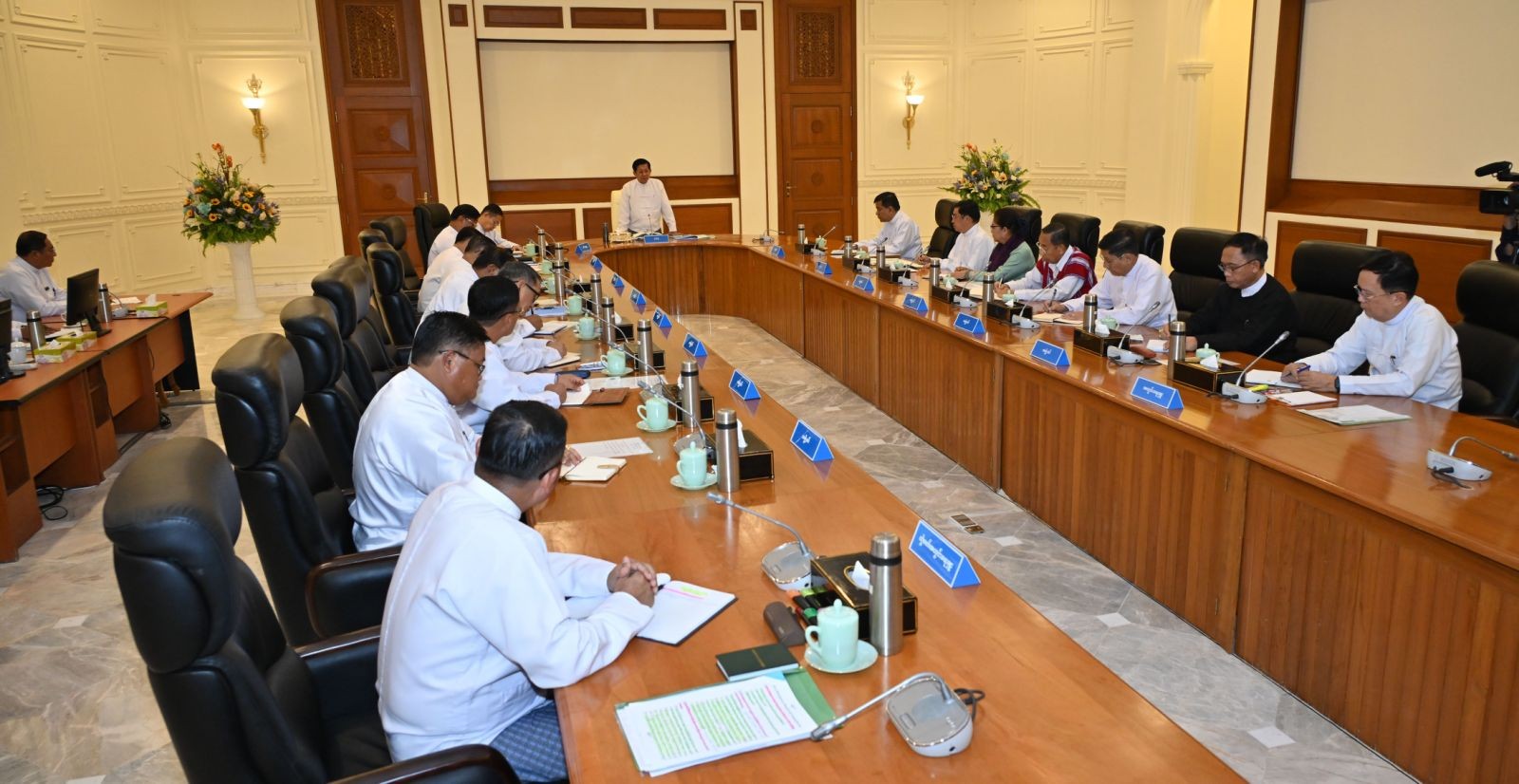
The SAC was carrying out in accordance with the agreements in terms of the NCA and some EAOs that had agreed to cease fire with the Myanmar Tatmadaw were violating the agreement, said chairman of the SAC.
Because the country was a union in which a variety of ethnicities were living together, the Myanmar Tatmadaw was carrying out restrainedly and didn't attack the EAO's military camps for the sake of the union, he added.
The SAC was carrying out in rder to meet and discuss with political parties and the EAOs that has signed to cease fire in the near future in relation to the peace of the union, said Sr-Gen Min Aung Hlaing.
The election of representatives for the political parties group of the Union Peace Dialogue Joint Committee was held on 25th and 26th May, 2024. Among the 10 NCA signatories, seven EAOs have formed themselves as an ally.

- By CNI
- Category: English Section
- Hits: 611
CNI News
11 June 2024
The Barter system (any exchange of goods and services for other goods and services without exchanging any form of money) of the State Administration Council (SAC) could reduce trade, said traders.
The SAC has instructed to start practicing the barter system between the trading partner countries in order to reduce the need for foreign currency, according to traders.
Barter system is the one that was used in ancient times and no country uses it anymore. However, because of the demand for foreign currency in Myanmar at present, the SAC reanimate the system, reviewed some people.
If that system was practiced again, trade would be reduced; because there was a gap between the goods that the trading partner countries wanted to import and those they wanted to export, it could be difficult for traders; and in the end it would affect the public, said an economic analyst to CNI News.
" The trade would be reduced because we want to import medical products after exporting rice, for example, but we have to import medical products from India, but India is exporting rice. So, how can we buy medical products from India? In fact, we'll have sell our rice to China and we'll have to buy medical products from India with the money we get from China. We sell rice to Bangladesh, but we don't have to import a lot of goods from Bangladesh. But we have to import a lot of products from China. It won't affect the public directly, but traders. At any rate, in the end it will affect the public." he said.
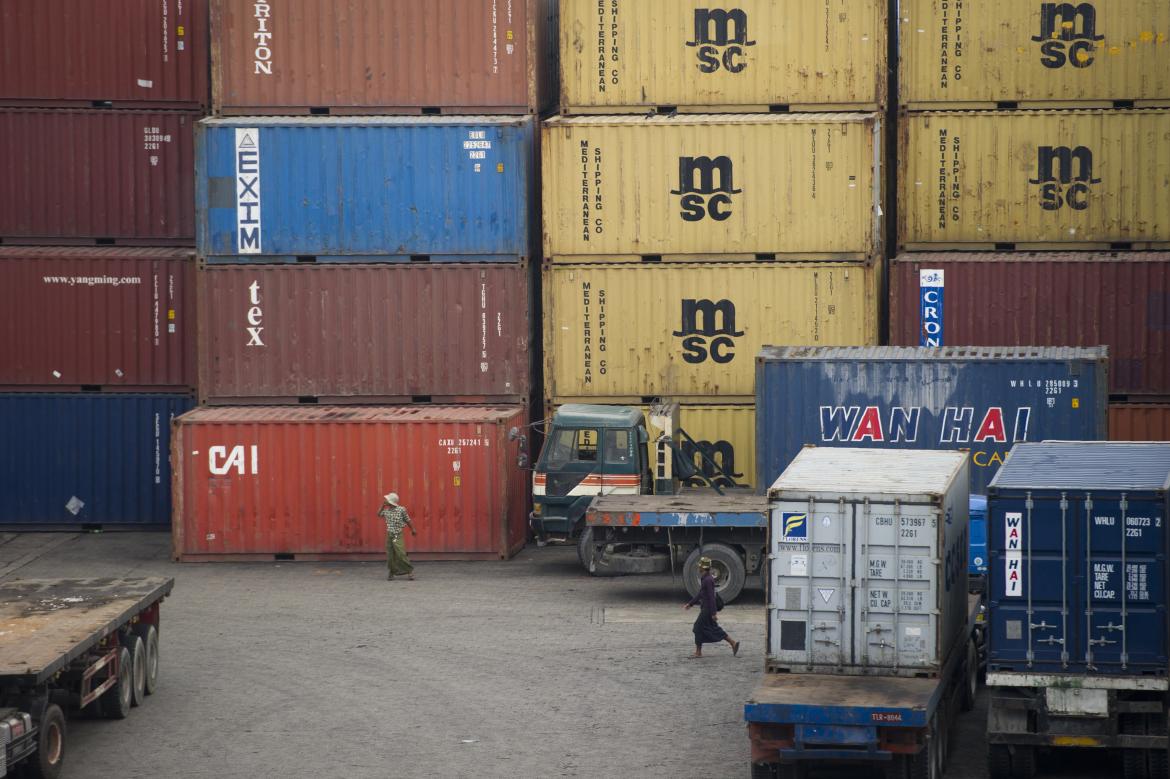
While seeing container boxes
Not only can high qualified products not be manufactured in Myanmar, the country's inflation rate is also higher at present. So, the barter system wouldn't be convenient, said traders. 65 percent of the export earnings (dollars) can be sold at the market price and 35 percent must be sold at 2,100 kyats per dollar designated by the Central Bank of Myanmar.
Due to the need for foreign currency and difficulty getting import license, import and export companies and private entrepreneurs possibly proposed to use the barter system, estimated economic analysts.
" If you are asked to do it like this in this country, you must do it like this. After doing it, report the difficulty. And then, maybe another change will happen. When we import, can we import the products that we want to? We need to know that. The products you import may be fuel or edible oil or construction materials or medical products. And then, you have to sell them within the country." said U Thant Zin Tun, vice chairman of the Myanmar Corn Industrial Association.
The barter system that will be currently used was similar to the one in which fuel and edible oil were allowed to be imported only if agricultural products were exported.
However, it was unclear what products would be allowed to be imported from the country that Myanmar export its goods and what goods would be exported to that country, according to exporters.

- By CNI
- Category: English Section
- Hits: 620
CNI News
10 June 2024
Undocumented foreigners, workers whose jobs are different from those described on their permits and passport holders with no permits in Malaysia were being arrested, Myanmar people who are staying in Malaysia told CNI News.
The Malaysian government probably would not issue new permits to foreign migrants because it wanted to reduce the number of foreign migrant workers, U Barbu Gyi who is helping Myanmar citizens in Malaysia, told CNI News.
" In my opinion, The Malaysian government probably won't issue the residence permits anymore. The Malaysian authorities are mainly arresting undocumented foreigners who entered illegally, documented people whose residence permits have expired and the workers whose jobs are different from those described on their permits." he said.
The Myanmar people have warned that workers should not believe brokers who are saying that they will perform to get permits for workers.
If the people who had documents and no permits were arrested, they would be sent back to their native countries and some of them would be punished like undocumented people reportedly.

While the Malaysian authorities concerned are checking suspects
If the workers whose jobs are different from those described on their permits were checked on the way, they would not be arrested. However, if they were checked at their factories, they would be arrested, Ko Par who lives in Malaysia told CNI News.
" The current arrests are different from the arrests in the past. There are a lot of workers without work permits here. Undocumented workers were mainly arrested in the past. If you had any documents, you would be released in the past, but now although you have passport, if you don't have permit, you will be arrested. And you will be arrested if your job is different from that described on your work permit." he said.
The Malaysian authorities have announced that they will issue Ricarli Braci permits in the end of June at the latest. Moreover, because the number of not only legal but also illegal alien workers is more than necessity, there are criticisms about it in Malaysia.
In addition to the planned arrests, the Malaysian authorities are also arresting because of Malaysian citizens' complaints. So, migrant workers who have arrived in Malaysia are facing more difficulties.
The Malaysian authorities both in uniform and in mufti are going to the places where migrant foreigners tend to stay and arresting illegal people reportedly.

- By CNI
- Category: English Section
- Hits: 656
CNI News
10 June 2024
The Arakan Liberation Party (ALP) has made preparations to get ready for military and political affairs in Rakhine State where battles are taking place, Major Khine Thurein, general secretary of the ALP told CNI News.
The ALP was on the way to political dialogue and it had made preparations to get ready for the security at the current time when battles were breaking out, he said.
" Politically, we are on the way to dialogue. And we have made preparations to get ready for our security." said Major Khine Thurein to CNI News.
170 joint troops that contained the Myanmar Tatmadaw, some of the ALP troops and Muslim troops trained by the Myanmar Tatmadaw blocked around Byaing Byu Village and tortured and killed the villagers, stated the Arakan Army (AA) on 2nd June, 2024.
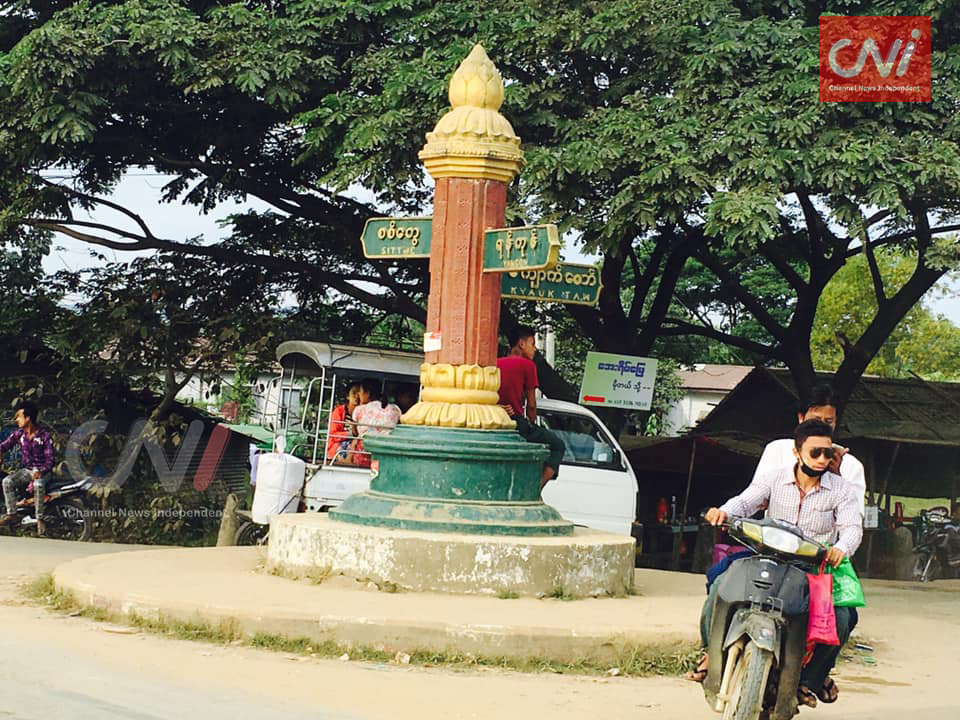
While seeing a crossroads in Rakhine State
However, the Myanmar Tatmadaw and the ALP denied the statement and said that it was spreading a piece of fake news and just a one-sided accusation.
Because the ALP was collaboratively active with the Myanmar Tatmadaw, it might protect the Rakhine public, but it could not protect the public at present, a resident of Sittwe, told CNI News.
" The ALP is working in collaboration with the military council, which is a disturbance to the Rakhine people because it doesn't stand firmly with the Rakhine people. Men were tortured and killed and some women were raped at Byaing Byu Village, according to the villagers. The ALP might be able to protect from doing like this because it was working with the military council. Because it could not prevent from doing like this, that happened." he said.
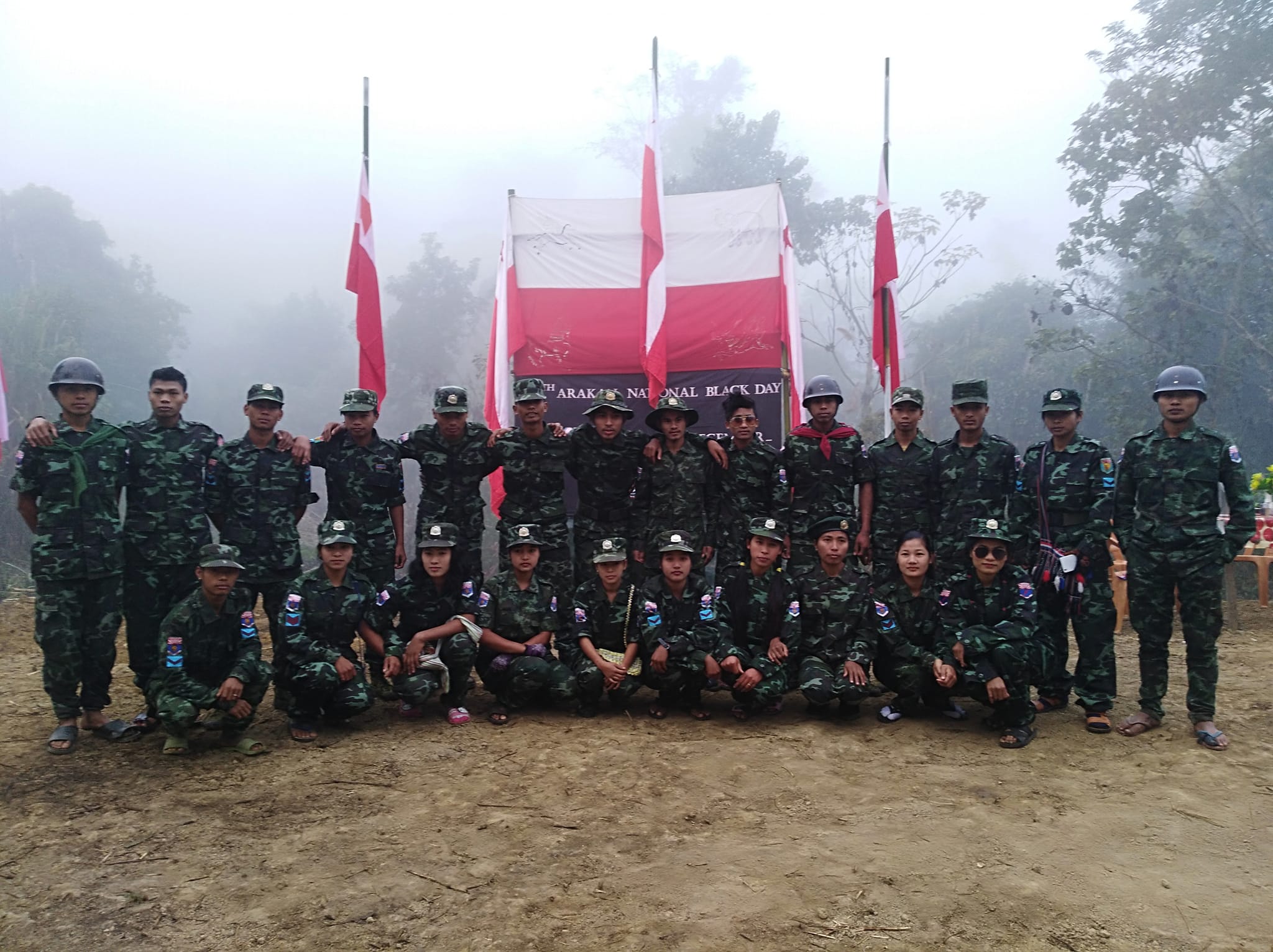
While seeing the ALP Force
If the problem arose from seeking the AA troops in the village because they could be there, he wanted to ask a question why four women were raped, he added. The ALP was working on security with the Myanmar Tatmadaw, said locals.
Although it was right that a tragedy took place in Byaing Byu Village, the ALP didn't involve in the commitment and all the organizations in Rakhine State were responsible for the casualties of the Rakhine people, Major Khine Thurein told CNI News.
" All the organizations in Rakhine State are responsible for the casualties of the Rakhine people. If the battles were reduced, the casualties of the innocent people would be reduced. At last, there will be no casualties. So, negotiation and discussion should be conducted so that battles could be reduced." he said.
The ALP is a Rakhine EAO that has signed the Nationwide Ceasefire Agreement (NCA).

- By CNI
- Category: English Section
- Hits: 513
CNI News
10 June 2024
Rice export to foreign countries is declining during the current rainy season and it is lower than last year reportedly from the Myanmar Rice Federation.
Rice export to foreign countries is declining because it is difficult for trucks and ships to go during this rainy season and to hire labourers. Although about 150,000 tons of Myanmar rice could be exported normally in the past, currently rice less than 100,000 tons only can be exported, an official from the MRF told CNI News.
" As now is the rainy season, going by container car is no problem. But the amount of rice loaded on a big ship is reduced a bit due to weather conditions. And it's difficult to rent trucks. It's difficult to hire workers when exporting goods. We are exporting rice but the amount is not much. This year, it rained a little more. We normally exported about 150,000 tons of rice at a time like this in the previous years, but this year the export doesn't even reach until 100,000 tons." he said.
Eight ships have berthed at eight domestic ports to export 130,000 tons at present, according to the MRF.
Although 2.5 million tons of rice and broken rice were planned to be exported in the 2024-2025 fiscal year, due to the current difficulties, they were finding alternatives to export a lot of tons of rice in the rest months of the fiscal year, said rice traders.
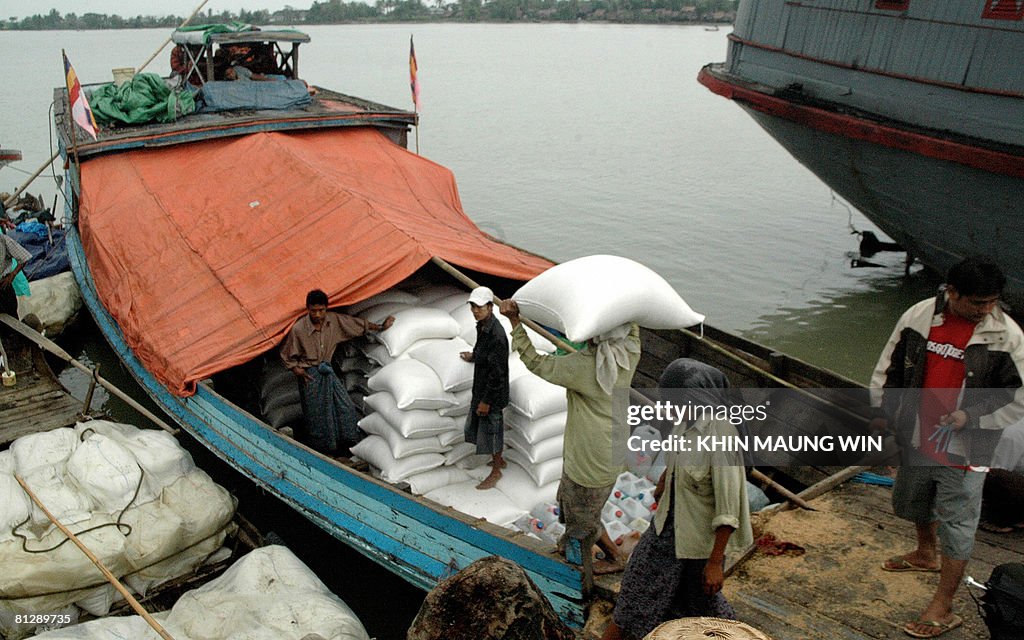
They are trying to export rice by way of accumulation in the vessel's belly like broken rice reportedly.
Moreover, they have demanded to allow them to import trucks to use in carrying rice and it was necessary to export a lot of rice in the rainy season because old rice is abundant at present, U Aung Lin, a rice traders, told CNI News.
" We need to import anymore of trucks. We are finding a way that rice can be put on the ship even when it rains. It's not too bad if we can export a lot of rice in the rainy season because at present, old rice is still abundant. But in August and September, old rice is scarce when its price goes up a bit. At that time, export of rice tends to be lower." he said.
Myanmar earns about 800 million dollars from exporting rice each month as export earning and has expected to earn between 700 and 1,000 million dollars from exporting rice in the current fiscal year.

- By CNI
- Category: English Section
- Hits: 422
CNI News
8 June 2024
Because there has been an excessive increase in the price of fuel in Putao Township, Kachin State and fuel cannot be bought there, people in the township have to be using their physical strength to plow for their hill-side cultivation, according to Putao locals.
Farmers sold their cattle and bought tractors. However, they could not be used because of difficulty getting fuel reportedly.
The people especially in Naungmoon region of the township are using their physical strength to plow, U Bran Shaung, a resident of Putao, told CNI News.
"People from two households that have no cattle collectively plow by their physical strength in Naungmoon and Pananpin Townships. But later, people from other places, who don't have enough fuel also plow like that. Some farmers have no cattle. Other farmers sold one or two cattle of theirs and bought small Chinese tractors, so they have no cattle and then they have to plow by their physical strength. Mainly, plowing by man's physical strength can be found more in Naungmoon region." he said.
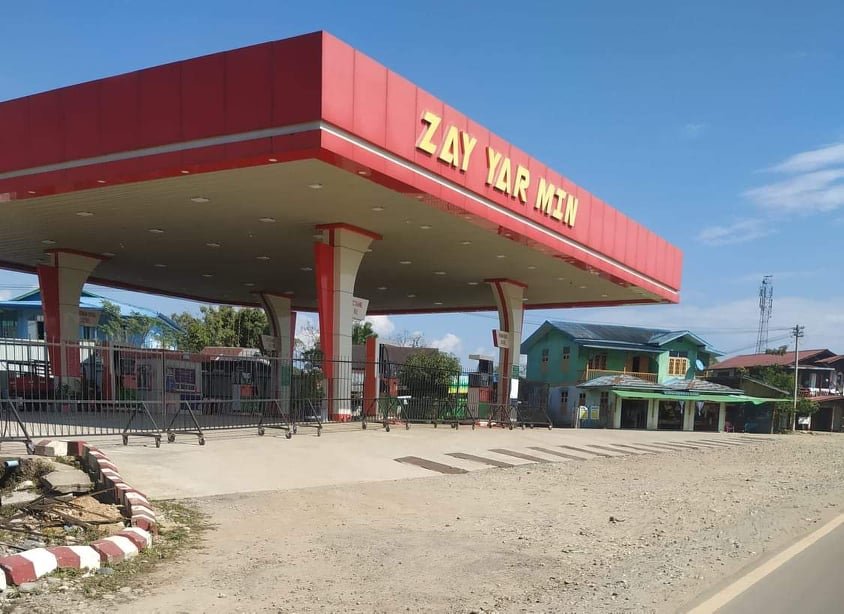
While seeing a petrol station
Putao Township mainly depends on goods coming from Myitkyina Township and the Myitkyina-Putao Road has not been able to be used since before the last water festival because of battles.
So, there has been a shortage of basic foodstuffs including fuel and the prices are going up exorbitantly. Currently, the price of fuel is 100,000 kyats per litre and it cannot be bought easily. Although fuel is carried on shoulders from the Indian bordera and sold, Just a little amount could be available, Ko Di Tan, a resident of Putao, told CNI News.
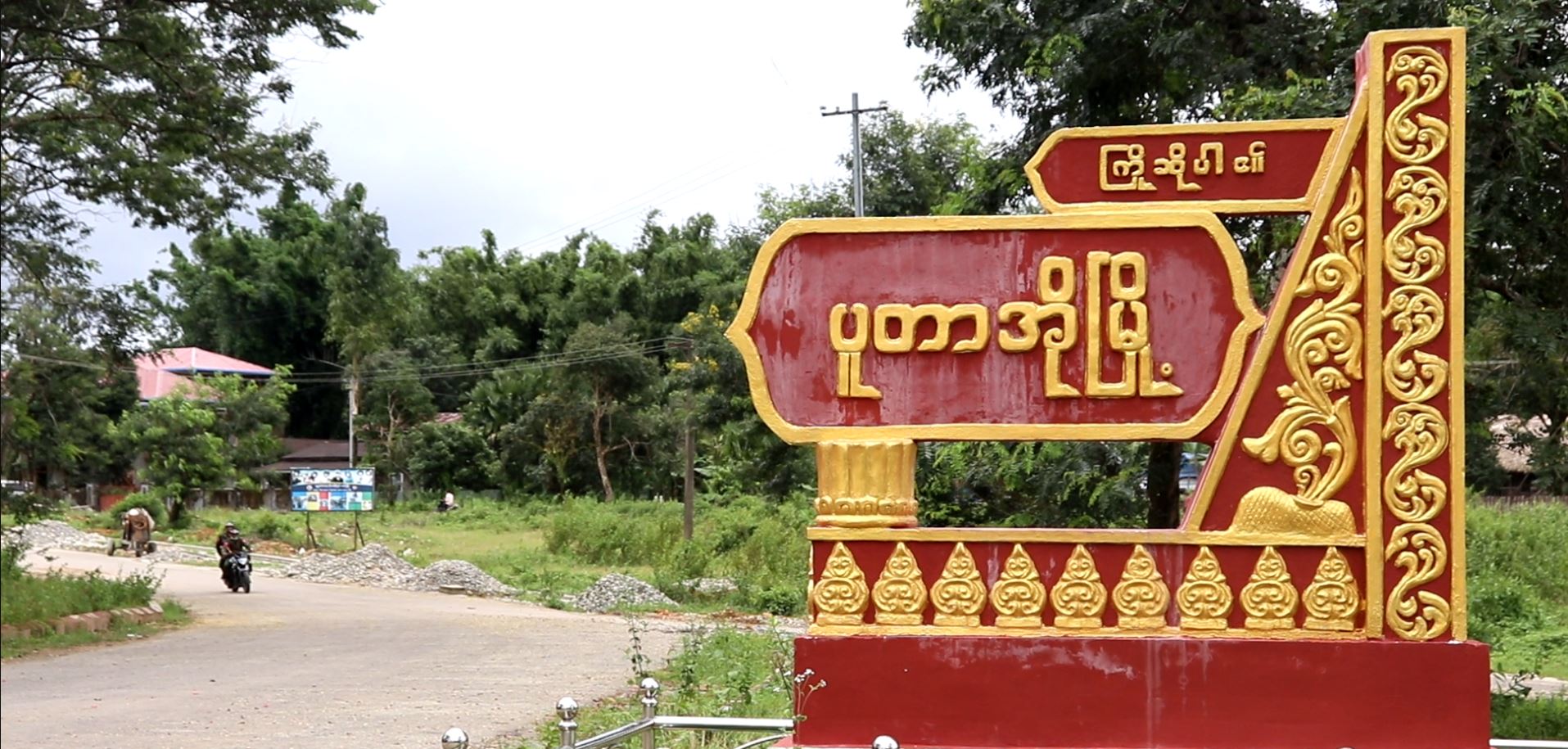
While seeing the entrance to Putao Town
At present, goods for Putao Township are being carried by plane and an egg is paid 1,000 kyats and there have been a shortage of dried noodle and other foodstuffs.
Although now is the school opening season, students cannot buy books, ballpoint pens, school uniforms and pencils as much as they need. The price of one dozen blank books is 40,000 kyats and some parents are finding it difficult to buy the books for their children reportedly.

- By CNI
- Category: English Section
- Hits: 487
CNI News
8 June 2024
The grouping process of the Union Peace Dialogue Joint Committee (UPDJC) no longer existed, Col. Saw Kyaw Nyunt, spokesperson of seven NCA signatory EAO group, told CNI News.
Implementation activities of the Nationwide Ceasefire Agreement (NCA) had stopped since 1st February, 2021 and the processes of the NCA could not be carried out during the past three years, he said.
" One thing we'll have to beware of is that implementation activities of the NCA had stopped since 1st February, 2024. The mechanisms of the UPDJC or Joint Monitoring Committee haven't operated for over three years. And the grouping processes of the UPDJC are no more as well. To tell you frankly, we are working on three pieces of the NCA essence _ to solve the political problem by political dialogue, to hold an all-inclusive political dialogue and to protect civilians." said Col. Saw Kyaw Kyunt.
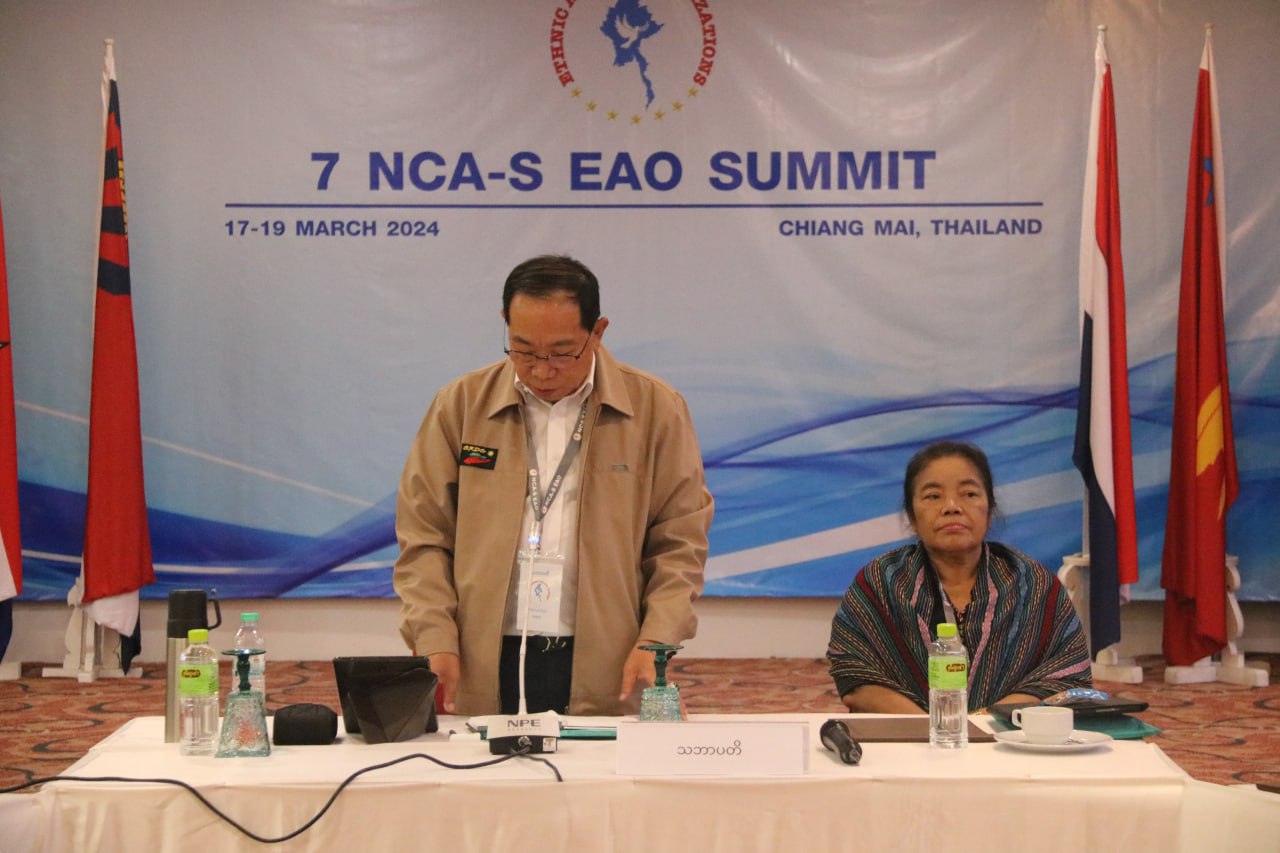
While seeing General Yawd Serk
Delegates of the political parties group of the UPDJC were elected from 47 parties that have got political registration and the political parties group is led by four political parties reportedly.
They had a desire to build a federal democratic union, ending the civil war since the drafting the NCA in 2013, Col. Saw Kyaw Nyunt told CNI News.
" We had the same desire since the drafting the NCA in 2013. We would end the civil war. We would build peace and then we would build a federal democratic union that would arise in accordance with the agreement by all democratic elements and ethnic groups after discussion and negotiation. But these activities have stopped for the time being. Looking ahead to the benefit of the Union, a political dialogue of all the stakeholders is the only way to solve the current great problem." he said.
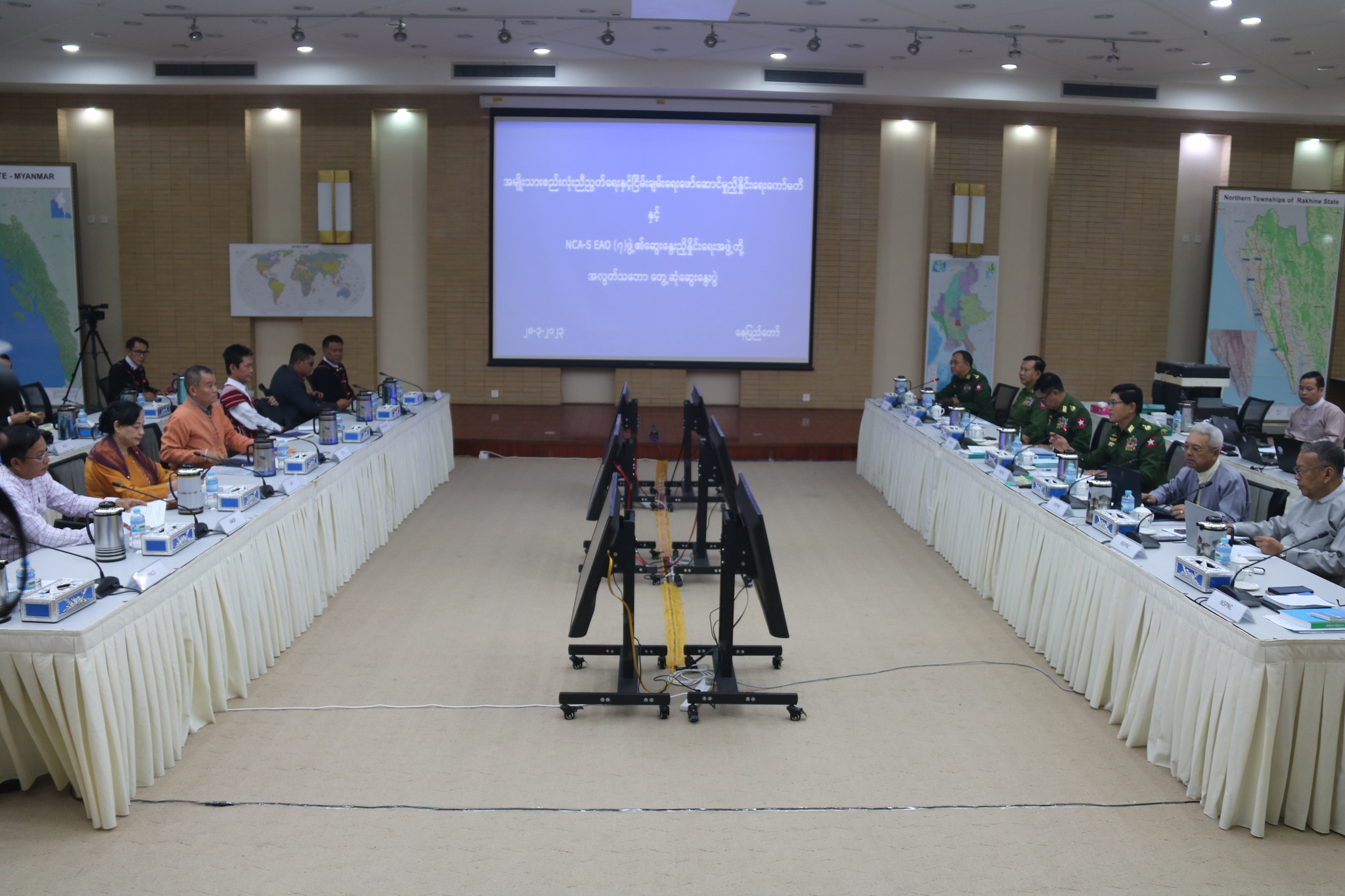
While seeing seven NCA signatories and the NSPNC
Although the political problem must be solved by the political means, because the military framework is wide and the political framework is narrow at present, it was difficult to resolve it, he added.
The UPDJC must be made up of 16 representatives each from the government, the Tatmadaw and the Hluttaw, from the NCA signatories, and the political parties group, which has been imposed in the NCA.

- By CNI
- Category: English Section
- Hits: 533
CNI News
8 June 2024
Because a democracy could not be established by waging a war, the democracy should be established through a common consent, said U Harn Yawnghwe, director of the Euro-Burma Office.
U Harn Yawnghwe said the above in an interview broadcast by the DVB on 5th June, 2024.
" Even if the Myanmar Tatmadaw could put down all the groups that go against it, there is no chance of becoming a democratic country. In the same way, even if all the groups that don't like the Myanmar Tatmadaw could defeat it, there is no chance of becoming a democratic country because a democracy cannot be established only after fighting with arms. Democracy is a system that must be built by common consent or agreement by everyone. So, we need to find a political solution." said U Harn Yawnghwe.
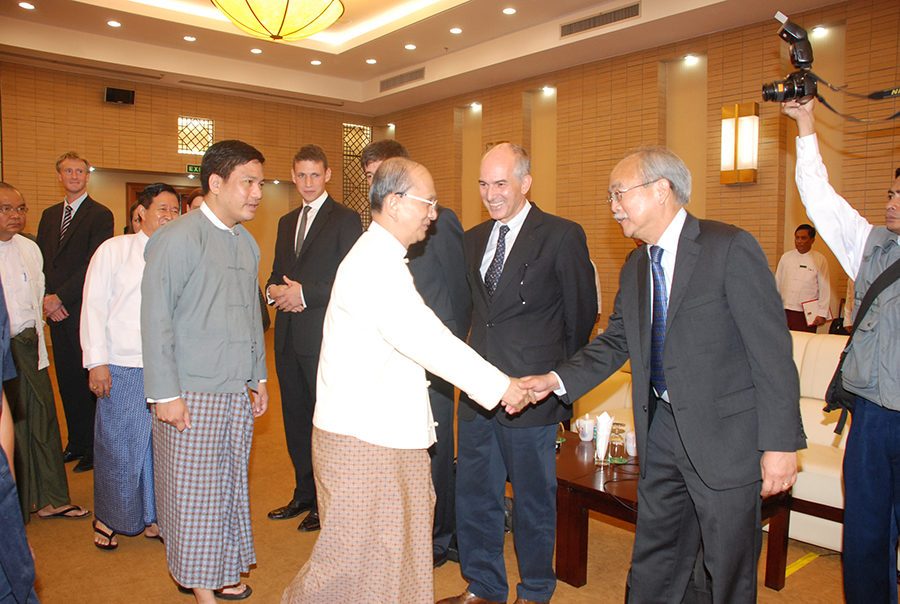
While seeing U Thein Sein and U Harn Yawnghwe
However, it was very difficult to hold a political dialogue in order to find a political solution because the public was completely suffering, he pointed out.
" it's impossible to hold a political dialogue so as to find a political solution at a time like this because the public is suffering from losses when the Tatmadaw is fighting against the public. It's likely only when the fighting stops." he said.
Battles should be stopped in order to be able to build a democratic country in Myanmar; all revolutionary groups should put pressure on the Tatmadaw to bring about a political dialogue; moreover, it was impossible to overcome the Myanmar political crisis without China, he added.
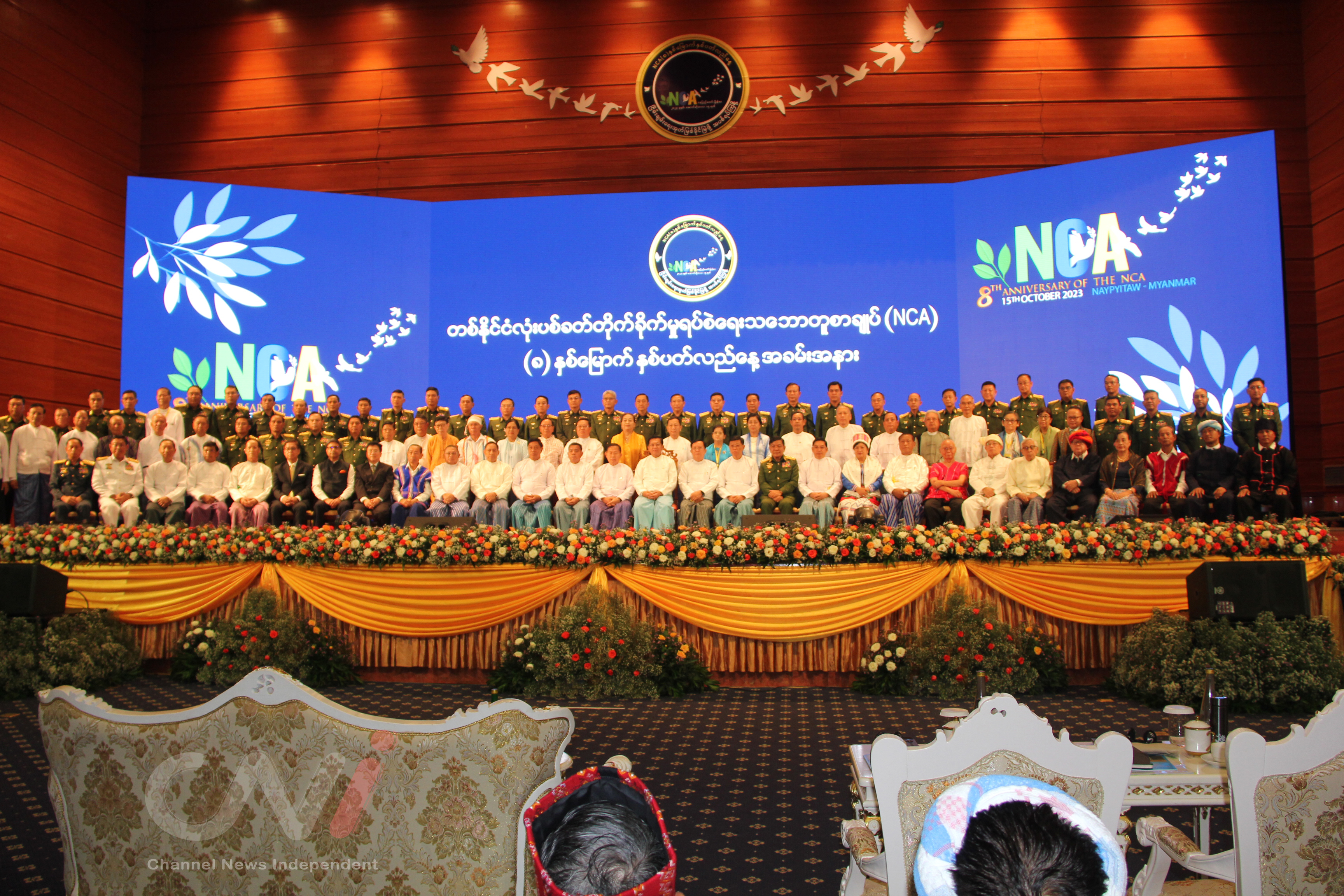
While an anniversary celebration of the NCA was held
U Harn Yawnghwe participated deeply in the peace process under the government led by U Thein Sein that transformed from 2021 and at present, he is helping in the peace process of EAOs.
Currently, the Myanmar Tatmadaw is waging battles against the Kachin Independence Army (KIA), the Arakan Army (AA), the Chin National Front (CNF), the Ta'ang National Liberation Army (TNLA), the Myanmar National Democratic Alliance Army (MNDAA), the Karen National Union (KNU), the People's Defense Forces (PDFs), the Local People's Defense Forces (LPDFs) and the All Burma Students Democratic Front (ABSDF) and battles are breaking out in many parts of the country.

- By CNI
- Category: English Section
- Hits: 537
CNI News
7 June 2024
The Rakhine people would fight to get a status not lower than confederation, Major General Tun Myat Naing, said commander in chief of the Arakan Army (AA) in an interview with the VOA.
" We, Rakhine people are fighting with a view to getting a political status not lower than confederate. Our position will never change. We'll never ask anyone to get it. If we should fight to get it, we'll have to do so. And then, we'll reconstruct. If we agree with each other with full understanding and generosity, everyone will be able to enjoy peace in the united future." said Maj-Gen Tun Myat Naing.
At present, battles are taking place in many parts of Rakhine State between the Myanmar Tatmadaw and the AA. The Myanmar Tatmadaw has to be retreating from its military camps in urban and rural areas while the AA is making preparations to launch an offensive to Sittwe.
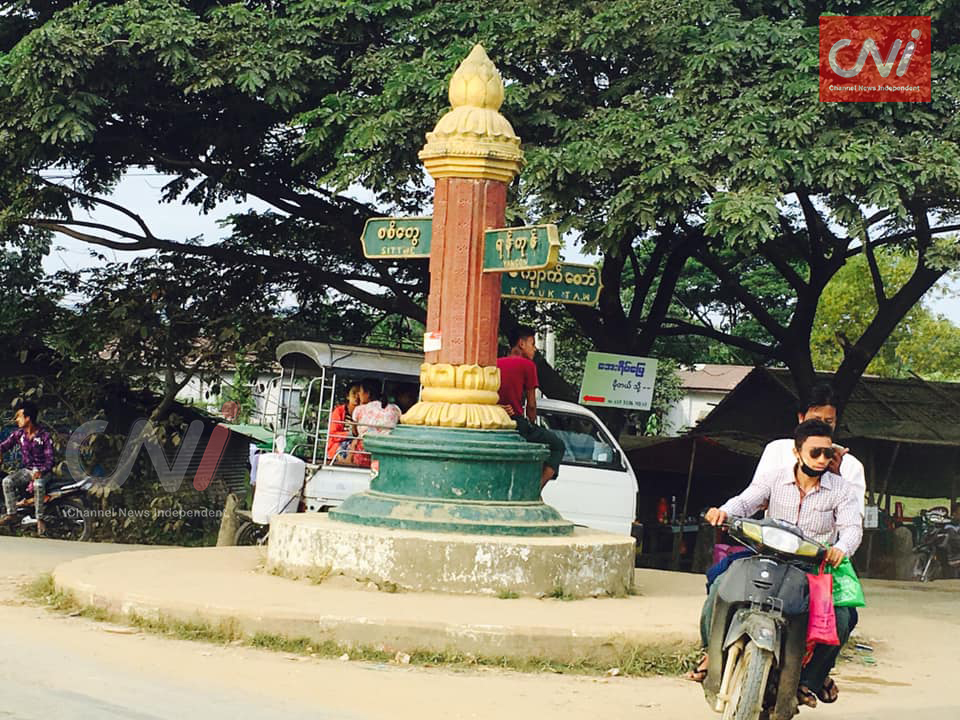
While seeing a junction within Rakhine State
The AA took part in Operation-1027 waged on 27th October, 2023 by the three northern allies (TNLA, AA, MNDAA) and in cooperation with the People's Defense Force (PDF) troops and Chin armed groups, the AA is fighting against the Myanmar Tatmadaw in Sagaing, Magway Regions and Chin State.
The AA has expressed already that it wants to get a political status like that of the United Wa State Army. On the other hand, it is meeting and discussing with the SAC through the China's mediation to stop battles taking place between the AA and the Myanmar Tatmadaw.



